Fostering Dialogue in Family Life

With a little less than 6 months left in the Year of the Family, it can be good for us to renew our dedication to the family! One way we can show our love for another is through thoughtful, meaningful dialogue. Taking the time to foster open, healthy dialogue in family life can go a long way in helping family members feel loved, heard and understood.
Below are 6 quotes from the section on dialogue in Amoris Laetitia. Pope Francis provides us with some very clear, helpful suggestions for what we can do in our families – whether natural or spiritual.
“In the family, “three words need to be used. I want to repeat this! Three words: ‘Please’, ‘Thank you’, ‘Sorry’. Three essential words!”. Let us not be stingy about using these words, but keep repeating them, day after day… The right words, spoken at the right time, daily protect and
nurture love.” – #133
“Dialogue is essential for experiencing, ex- pressing and fostering love in marriage and family life. Yet it can only be the fruit of a long and demanding apprenticeship. Men and women, young people and adults, communicate differently. They speak different languages and they act in different ways. Our way of asking and responding to questions, the tone we use, our timing and any number of other factors condition how well we communicate. We need to develop certain attitudes that express love and encourage authentic dialogue.” – #136
“Everyone has something to contribute, because they have their life experiences, they look at things from a different standpoint and they have their own concerns, abilities and insights. We ought to be able to acknowledge the other person’s truth, the value of his or her deepest concerns, and what it is that they are trying to communicate, however aggressively. We have to put ourselves in their shoes and try to peer into their hearts, to perceive their deepest concerns and to take them as a point of departure for further dialogue.” – #138
“Fraternal communion is enriched by respect and appreciation for differences within an overall perspective that advances the common good. We need to free ourselves from feeling that we all have to be alike.” – #139
“Love surmounts even the worst barriers. When we love someone, or when we feel loved by them, we can better understand what they are trying to communicate.” – #140
“Let us acknowledge that for a worthwhile dialogue we have to have something to say. This can only be the fruit of an interior richness nourished by reading, personal reflection, prayer and openness to the world around us. Otherwise, conversations become boring and trivial.” – #141

